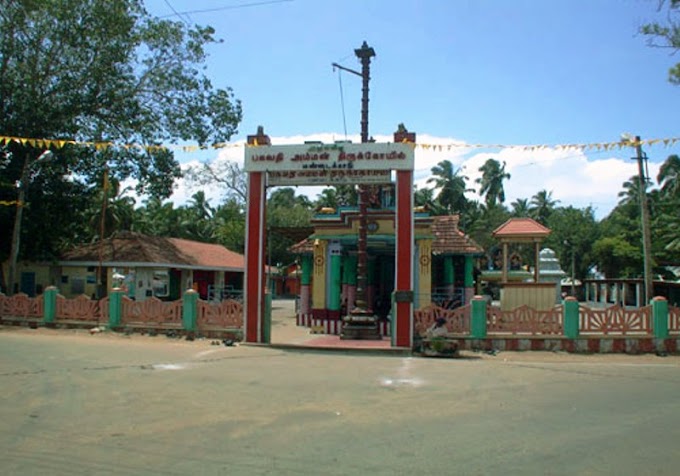PMK's Agricultural Shadow Financial Statement for 2021 - 2022 was released today (June 27).
Its main features are:
1. 1. Pamaka has been insisting for many years that a separate financial statement be submitted for agriculture in order to promote agricultural development in Tamil Nadu.
For the first time in the history of Tamil Nadu, the Governor of Tamil Nadu has announced in his speech that a separate financial report will be submitted for agriculture from this year. With this in mind, Pamaka has carefully prepared and published the Agricultural Shadow Financial Report for the current year to guide the Government of Tamil Nadu.
2. Bamaga’s Agricultural Shadow Financial Statement is prepared each year based on a key objective. This shadow financial statement has been prepared with a focus on declaring the year 2021-22 as the Agricultural and Agricultural Education Framework Development Special.
Numerous new projects for agricultural infrastructure and agricultural education infrastructure have been announced in this shadow financial statement.
3. Refrigerated warehouses will be set up in all circles to preserve agricultural produce including vegetables, fruits and flowers.
4. Large warehouses with drying facilities will be set up to store paddy bundles procured from farmers.
5. At least 5,000 paddy bundles will be stored at the procurement centers. This will ensure that the paddy bundles are no longer damaged by the rains.
6. Food processing factories will be set up in all districts.
7. Technology and structure for value addition will be developed in each area to facilitate the farmers to add value to their produce.
8. Export centers will be set up in all districts to facilitate the export of value added products.
9. A new Horticultural University will be set up at the Tamil Nadu Government Horticulture Farm Campus in Karumanthurai, Salem District. 4 Horticultural Colleges in Tamil Nadu will be attached to it.
10. A new silkworm rearing college will be set up at the silkworm rearing farm in Hosur, Krishnagiri district. It will come into operation in the next academic year.
11. A Research Center for Irrigated Crops will be set up in Mecheri, Salem District in Tamil Nadu to engage in new varieties of research and nutrient management by developing rainfed tomato and banana varieties.
Agricultural Education - 3 New Universities
12. Tamil Nadu will be divided into 4 zones and an Agricultural University will be set up in each zone. While Coimbatore already has an Agricultural University, new universities will be set up in Thanjavur, Vellore and Nellai.
College of Agriculture in Tindivanam
13. An Agricultural College will be set up for the four districts. Each university will work with the agricultural colleges under its jurisdiction to help solve the problems of agricultural production and farmers in the area.
14. A new Government Agricultural College will be set up at the Oilseed Research Center under the control of the Tamil Nadu Agricultural University on an area of 140 acres in Tindivanam, Villupuram District. It is the 2nd Agricultural College to be set up in the Northern Districts. Admission to this college will begin next academic year.
15. A Rice Technology Park will be set up in Thanjavur to increase paddy production. Through this modern technologies will be taught to the farmers.
16. The Government has decided to allocate a total of Rs. 47,750 crore to the agriculture sector in 2021-22. This is about 4 times more than the Rs 11,982.71 crore allocated in the Interim Financial Statements for 2021-22.
17. Rs. 12,100 crore will be spent on farmers' capital subsidy in the financial allocation for the agriculture sector.
18. Rs. 15,000 crore will be spent for the implementation of irrigation projects.
19. Rs. 7,000 crore will be spent on projects to improve agricultural infrastructure, agricultural education and research infrastructure.
20. Rs 13,650 crore will be spent on other schemes including crop insurance.
50 lakh new jobs
21. The target is to create 50 lakh new jobs in the agriculture and horticulture sector. These jobs will be created in the next 5 years.
22. Agricultural and Horticultural Advisory Centers will be established in rural areas to coordinate agricultural and engineering graduates. They provide advice and services on agriculture, horticulture and marketing in their respective areas. This will provide employment to 5 lakh people.
23. Measures will be taken to safely seal the Neera drink extracted from coconut trees and sell it throughout Tamil Nadu. Through this project, 1 lakh people in Tamil Nadu will get direct employment and 2 lakh people will get indirect employment.
24. Goats, chickens, turkeys and fish will be sold through rural self-help groups. Modern restaurants will be set up in major cities and along the roadsides by graduate youth groups and self-help groups will provide delicious cooked goats, chickens and fish. Thus, millions of people will get employment.
Capital grant up to Rs.36,000
25. Small and marginal farmers in Tamil Nadu will be given a capital subsidy of Rs. 10,000 per acre up to a maximum of Rs. 30,000. A maximum of Rs 36,000 will be provided, including Rs 6,000 provided on behalf of the Central Government. The subsidy is Rs 16,000 per acre, Rs 26,000 for two acres and Rs 36,000 for 3 to 5 acres.
26. Farmers who own more than 5 acres of land will be given Rs.
27. The remaining Rs. 7,110 crore will be disbursed to the Co-operative Banks within the current year in addition to the Rs. The government will provide an additional Rs 248.85 crore as interest on this amount.
28. The Government of Tamil Nadu has decided to provide crop loans to the tune of Rs. 14,000 crore through Co-operative Banks.
29. No interest will be charged on loans provided by Co-operative Banks. In addition, a subsidy of 10%, up to a maximum of Rs. 10,000, will be given to farmers who repay the loan in installments.
Public Sector Bank Loan Discount
30. Of the loans taken by farmers in public sector banks, only crop loans of Rs. 12,000 crore apart from capital loans will be waived. The Government of Tamil Nadu will provide this amount to the public sector banks along with interest in 3 equal installments.
Revitalization project for sugarcane cultivation
31. Sugarcane cultivation and sugar production in Tamil Nadu have declined by one-third in the last 11 years. Sugar production in Tamil Nadu will be less than 6.52 lakh tonnes in 2020-21. To change this situation, a new project will be implemented with the aim of doubling the area under sugarcane cultivation in the next 3 years.
32. Rs. 1,500 crore due to sugar mills for sugarcane farmers will be disbursed in two installments in April and September. The Government of Tamil Nadu will provide an interest free loan of Rs. 1,500 crore to sugar mills for this purpose.
33. The Government of Tamil Nadu will obtain low interest loans from the Central Government to meet the other debts of the sugar mills.
34. Rs. 4,500 per tonne will be provided as purchase price for 10% sugarcane purchased from farmers. Purchasing prices for sugarcane will also be raised to improve the financial condition of sugar mills. This will be monitored by the government.
Special program
35. A special scheme will be implemented to transform agriculture into a profitable industry.
36. A permanent solution plan has been prepared to provide immediate compensation to crops affected by natural calamities including rains, floods, droughts and storms. Accordingly, compensation will be made to the affected agricultural crops within a month.
37. Compensation of Rs. 25,000 per acre for paddy, Rs. 90,000 per acre for sugarcane and Rs. 25,000 per hectare for groundnut affected by natural calamities.
38. Compensation for other cash crops up to Rs. 1 lakh per acre depending on their market value.
Climate change urgency
39. A climate change emergency will be declared. A plan will be developed and implemented to combat the ill effects of climate change.
40. An effective agriculture plan will be implemented to prevent agriculture from being affected by the adverse effects of climate change.
41. The Government of Tamil Nadu will take steps to implement an efficient agricultural system suitable for the climate. A committee comprising secretaries of the departments of agriculture, environment, revenue and finance and the commissioner of revenue administration will be set up for this purpose.
Agricultural Products Pricing Commission
42. The State Government has decided to fix prices for all types of food grains grown in Tamil Nadu so that farmers can get adequate purchase prices. An Agricultural Product Pricing Commission will be set up for this purpose.
43. Representatives of Agricultural Associations along with officials from the State Finance, Agriculture and Food Departments shall be appointed as members of the Agricultural Product Pricing Commission.
44. The Purchasing Price will be determined by the Product Pricing Commission after calculating the production cost of the crop as well as adding 50 per cent profit.
Agricultural Produce Procurement Authority
45. The State Government has decided to fix the purchase price for all types of food grains in order to make higher profits for the farmers in Tamil Nadu. An Agricultural Produce Procurement Board will be set up for this purpose.
46. The purchase price of one quintal of paddy will be fixed at Rs. 3,000 in 2021-22.
47. The Government of Tamil Nadu has set a target of 6% agricultural growth per annum with a view to doubling the agricultural income. An expert panel will be set up to recommend the steps to be taken for this.
48. The number of working days will be increased to 150 through the Mahatma Gandhi Rural Employment Program. The scheme will be extended to agricultural activities.
49. A small share will be paid on behalf of the landowners in the wages to be paid to the workers engaged in agricultural work. The government will pay the remaining salary.
50. By increasing the ground water level in Tamil Nadu, a revolutionary water enrichment project will be implemented with the objective of ensuring that agriculture takes place even in summer.
51. For this purpose a small dam of half a kilometer will be set up on all the streams and streams, in which suction pits will be set up to a depth of 200 feet. Thus, the groundwater level will rise, which will be conducive to summer cultivation.
Cauvery & Godavari Link - Prepare Detailed Project Report
52. A comprehensive project report has been prepared for the Cauvery-Godavari link, which could be the biggest turning point in the history of irrigation in Tamil Nadu.
53. The Government of Tamil Nadu will ensure that other permits required for the Cauvery-Godavari link are obtained and construction begins by 2022.
54. Even if the Mettur flood water project is completed, it will not be of much use. Therefore, the Mettur flood water project will be expanded and implemented as a link project between Cauvery, Sarabhanga and Thirumanimuthuru.
One lakh crore irrigation project
55. The Irrigation Four Year Plan will be implemented from 2021-22 to 2024-25. Rs 1 lakh crore will be spent for this in 4 years. The objective of this project is to increase the irrigated area of Tamil Nadu from 26.79 lakh hectares to 50 lakh hectares. Rs 15,000 crore is currently being allocated for this project.
Cauvery & Gundaru Link Project
56. Cauvery Gundaru Linkage Project: The Cauvery-Gundaru Linkage Project was launched 69 years ago to alleviate poverty in Karur, Trichy, Pudukottai and Sivagangai districts. The purpose of this project is to connect the rivers Cauvery, Akkiniyaru, Korayaru, Pambaru, Vaigai and Gundaru. The Government of Tamil Nadu has decided to implement this project at a cost of Rs. 14,400 crore.
57. In the first phase of the project, 118 km of canal cutting work has been started from Mayanur Dam in Karur District to Vellaru in Pudukkottai District at a cost of Rs. 6,941 crore. An amount of Rs. 1500 crore has been allocated for this project. The project will be completed in the next 3 years.
58. Fig Tree - Avinashi project work is in full swing. The Fig-Avinashi project will be completed by the end of this year.
New irrigation schemes
59. Balaru Irrigation Project: Dams will be constructed at Nallathur, Alappuzha, Palaveli, Balur and Thirumukkudal to utilize the wasted water in the lake. The next step is to increase the Kanchipuram circle; Uttiramerur Circle Thirumukkudal; செங்கல்பட்டு வட்டம் அலப்பாக்கம்; As Madurantakam Circle LN Puram, dams will be built at four places. Rs 500 crore will be allocated for this project.
60. Tamiraparani - Nambiyaru Link Project: An average of 13 TMC of water is wasted annually from the Tamiraparani River into the sea. By connecting the Thamiraparani River, Karumeni River, Nambiyaru, Pachaiyaru, Korayaru and Elumichaiyaru rivers, the wasted water can be stored and channeled to Radapuram, Nanguneri and Sathankulam areas for irrigation. Rs 1,000 crore will be allocated for this project.
61. Tenpennai - Thuringalaru Link: Thuringalaru is the water source of the Nandan Canal project. The Nandan Canal receives water only during the monsoon season as it is a jungle. This water is not enough for the millions of acres of land that depend on the Nandan Canal. If the Nandan Canal project is to be fully utilized, the best way is to connect the Nandan Canal with the South Indian River. Rs 300 crore has been allocated for this.
Kollidam block will be completed in 6 months
62. Construction work on Kollidam river at a cost of Rs. 396 crore is 71% complete. These works will be completed in the next 6 months. Steps will be taken to make the Kollidam dam area a tourist destination.
63. As the Cauvery Irrigation Districts have been declared as Protected Agricultural Zones, new hydrocarbon projects will not be allowed in them.
64. Agricultural Special Economic Zones will be set up in each district. These special economic zones will be set up in each district depending on the agricultural produce. Everything from production to value addition and export takes place here. This will create new jobs in the area.
Agricultural Laws - State of the State
65. Farmers are afraid that they will be affected by the 3 agricultural laws passed by the Parliament. The Government of Tamil Nadu considers it the duty of the Central Government to allay these fears.
66. The Central Government should directly call the heads of agricultural organizations regarding agricultural laws and fulfill their demand. The Government of Tamil Nadu will insist on this to the Central Government.
Closure of sand quarries
67. All sand quarries in Tamil Nadu will be closed. Therefore, the production of M.Sand will be increased to prevent any damage to the construction work.
68. A special law will be passed to eradicate juniper trees in Tamil Nadu.
69. Steps will be taken to eradicate sessile oak trees using foreign technologies.
70. It will be prohibited to grow eucalyptus trees that are highly absorbent to ground water.
71. It will be prohibited to cut down the endangered Karbhaka Virutsamam palm trees.
72. A special scheme will be implemented to increase the number of palm trees in Tamil Nadu.
Separate Ministry for Water Resources - 2 new Ministries
73. The Water Resources Department has been separated from the Public Works Department in Tamil Nadu and a separate Minister has been appointed for it.
74. The Ministry of Agriculture will be divided into 3 Ministries of Agriculture, Horticulture and Agricultural Market.
75. A Cabinet Committee on Agriculture will be constituted under the chairmanship of the Chief Minister to implement agricultural projects and coordinate tasks. In this, 7 ministers related to agriculture will be featured.
76. A safal market will be started in Trichy, similar to the one in Delhi and Bangalore. This will allow products to be auctioned off electronically.
77. A federation of manufacturers will be formed at the circle and district level. The federation's leadership committee will set prices for the products harvested in that circle on a daily basis. Sales will be processed through that federation.
78. Large markets for horticultural products will be set up in every city and district capital like the Coimbatore market. Separate shops will be set up in the cities to sell natural agricultural products.
Free bus facility
79. Large markets for horticultural products will be set up in every city and district capital like the Coimbatore market.
80. Farmers will be allowed to load their produce on government buses free of cost after 8 pm for the convenience of transporting their produce to markets.
81. Tariffs will be waived at customs for goods transporting agricultural and horticultural goods from any part of Tamil Nadu.
82. Domestic chickens, goats, turkeys, etc. will be reared by rural self-help groups with the participation of graduate youth groups and the co-operative sector. Major cities and roadside restaurants will be set up.
83. As quality food is provided at cheaper rates by roadside cooperative restaurants, the risk of passengers traveling in buses and other vehicles eating substandard, unhealthy, unpalatable food at high prices will change.
84. Promoting high protein, low fat meat rabbit curry will reduce the consumption of high fat goat and beef.
85. A modern cattle farm will be started for each district. If the farmers buy as many cows as they want and hand them over to the cattle farms, they themselves will raise 1,000 cows with modern technology and send the rest of the milk to go abroad for domestic use to generate more revenue.
86. Ponds will be dug on the lands of the farmers with private contribution and government subsidy as per their land size and steps will be taken to cultivate fish.
87. With a view to increase the green cover in Tamil Nadu, 300 crore saplings will be planted in the next 5 years. The project is named as Green Tamil Nadu.
88. Agricultural Income Augmentation Scheme: Providing subsidy of Rs.
89. Redefining Agriculture to Expand Income Opportunities: Transforming agriculture into a profitable occupation with livestock, aquaculture, coastal aquaculture, dairy production, poultry farming, horticulture and value added activities with agriculture.
90. Industrialization of Agriculture: The objective of this policy is to transform agriculture into an industrial model through modern technology, mechanization and science based farm management to enable higher yields, better quality and decent prices.
91. Land Use Policy for Tamil Nadu: Prevention of Land Acquisition by Corporations in the Name of Special Economic Zones, Dividing Lands into Areas to be Protected, Areas to be Regulated, Areas for Sustainable Agriculture, Industrial Use and Non-Agricultural Use Areas, the last part of which Its main features are the use of all other areas exclusively for agriculture.
92. Modification of Primary Agriculture: A map of soil status will be prepared. Recovering the soil of small-scale lands and determining which crop to introduce in which area based on them will be its key features.
93. Combining expansion activities with rural development: The basis of this policy is the advancement of market and technological opportunities through the Rural Business Center set up by NABARD.
94. Food self-sufficiency: Strategies for food self-sufficiency include preventing the loss of surplus yields, protecting farmers from price changes and ensuring that the prices of food grains are reasonably fixed.
95. Three-pronged plan for rural economic revival: Establishment of Special Agro-Economic Zones, setting up of artisan workshop sets, three-pronged plans for rural communication initiatives.
96. We have submitted 281 ideas out of a total of 75 topics to the Government of Tamil Nadu to facilitate the implementation of agricultural development projects.
These should not be considered as projects of PMK, but as the demand of the farmers and the government should include the possible ones in the first agrarian financial statement of the Government of Tamil Nadu to be submitted in July; That fact must be taken into account. "
Thus it is stated.

























English News | Latest English News | Online English News | English News Live | Breaking News | Headlines | India News | World News